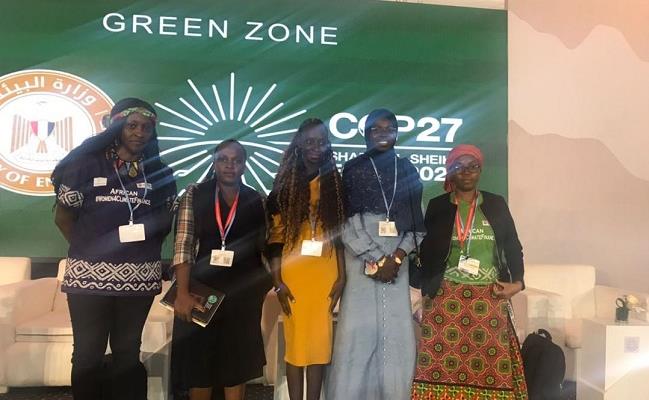Since women occupy over 50% of the world’s population, it is important to allocate finance to them to be able to respond to climate change challenges.

This formed one of the conclusions at a side event held on November 14, 2022, during the 27th Session of the Conference of the Parties (COP27) to the United Nations Framework Convention on Climate Change (UNFCCC) held in Sharm El-Sheikh, Egypt.
Tagged “African Women Perspectives on Loss and Damage”, the event held at the instance of Centre for 21st Century Issues (C21st) to celebrate the Gender Day at COP27.
Aisha Titilola Kazeem of C21st, who moderated the side event that featured a panel discussion session, stated that women should have access to climate finance and loss and damage finance. She enumerated how women’s inclusion is important in the climate change policies and decision-making processes.
Gender monitors from Uganda, Cameroon, and Kenya, who were part of the panel discussion session, shared their countries’ experiences as it affects women and the way forward.
While lamenting that women don’t have access to finance because their rights are not respected, the panelists observed that women are coming from a point of contribution on a daily basis to respond to a spectrum of problems that are caused by climate change.
“Women lack sources of economic empowerment and are forced to depend on their cattle. The resilience of women is basically in times of climate change. We urge leaders to take action to change the world and be gender responsive to climate change,” they stated, adding that lack of access to good road infrastructure as a result of loss and damage affect women.
They added: “Therefore, we want finance for loss and damage to come in, over that of adaptation and mitigation and call upon responsible duty bearers to ensure infrastructure are accessible for women.
“Women are already disproportionately affected with the way we live. In Uganda, men migrate from their household, and responsibility shifts to women to feed the family which is a form of gender-based violence. It’s necessary to support women in accessing finance looking at their nature and potential for us to be able to support the initiatives.
“Women are most vulnerable due to the level of their education; hardship areas and they are prone to female genital mutilation (FGM) and early marriages, such as in Kenya. There’s a need for more support and engagement to develop women’s capacity.
“Climate change diseases such as malaria posing parasites affects people especially women, girls and children. There are many cases of malaria in the African countries and there’s need to improve the health and well-being of women.”
They likened climate change challenges to environmental challenges, emphasising the need for blend in technology.
“We need to inculcate expertise in this field to solve the problem,” the panelists stressed, adding that transparency process is key, and that there’s need to understand the different levels of climate change from international to national, cutting across all levels.
